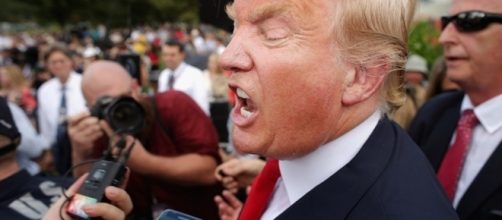As reports came in about President Trump's Friday night response to Tuesday's chemical attack, the debate at the time was over just how effective those military strikes against the Syrian airfield were. Military officials involved with planning the strikes said that it was a one-time operation which halted the perception that this would be the beginning of a longer campaign against the Assad Regime. But those questions by the media forced Trump to say that he would not be making any announcements of what he intends to do before he does it.
During his presidential campaign last year, he also said he would not give any details because he felt that it give the enemy an advantage.
During a news-making press conference this year, he was asked about what steps he would take against North Korea when he lashed out at the reporter who asked, saying that he wouldn't tell them and that he would make it so hard for them to get the information that they would eventually stop asking. Despite this, unless Trump intends to tighten his grip on officials who have provided information about the recent air strikes, reporters on the ground have covered the response by the U.S. military well enough for it to be in real time.
Officials speaking to the press
One report by The New York Times titled: "With Strike Aimed at Halting More Gas Attacks, U.S. Tries to Send Syrians Message" said that military officials spoke to the press during a briefing at central command in Tampa, Florida, under the condition of anonymity in accordance with Pentagon protocol.
Since Trump won the presidential election, he has taken a very aggressive stance against the media, from the beginning, even holding a meeting with some of the biggest names in the market to scold them for their negative coverage of him, which Blasting News covered. During White House Press Secretary Sean Spicer's first briefing to the press corp, he also attacked them on Trump's behalf and even argued about how unfair the coverage was over how many people were at Trump's inauguration ceremony versus the amount during Obama's.
In regards to reporting on the fallout of various staff members and the investigation being conducted on Trump over his connections with Russia, it's angered the President enough for him to say that the leaking of any information that led to many of these issues was illegal. This was a signal sent to loyal Republicans to focus their attention on leaks, even causing them to go after intelligence officials and taking their focus off of the investigation.
Even White House Chief of Staff Reince Priebus has come out to say that sources should reveal themselves if news reporting were to even be taken seriously. Currently, there appears to already be enough at risk for officials in various positions to have to claim anonymity.
Reading between the lines
Donald Trump has said that he likes the element of surprise. As Election Day neared, reporters were wondering if he would concede the election to Hillary Clinton were she to win. He said to the media that he probably wouldn't and that they would find out which under the perception that he would lose the election, became more of a national threat for not accepting the possibility that he was too extreme to be the nation's next president.
But it also showed Trump's love and hate relationship with the media, where he would rather be more vague than direct. Many reports on Trump's first cruise missile strike against the Assad regime's airfield point to the fact that he practically changed his views on the U.S. response in Syria overnight, which could suggest that he's more impulsive and might not know himself, what his next move is.

